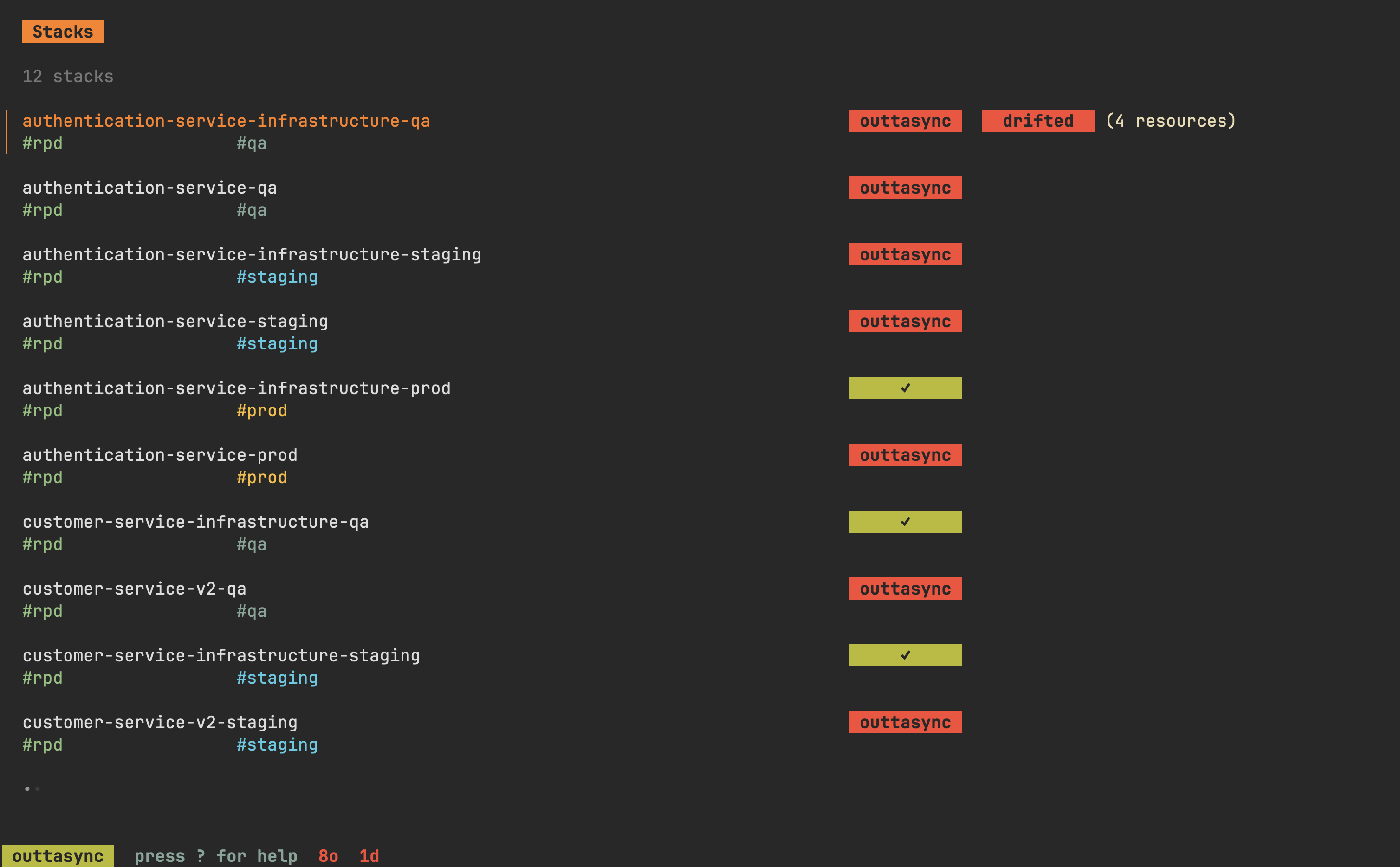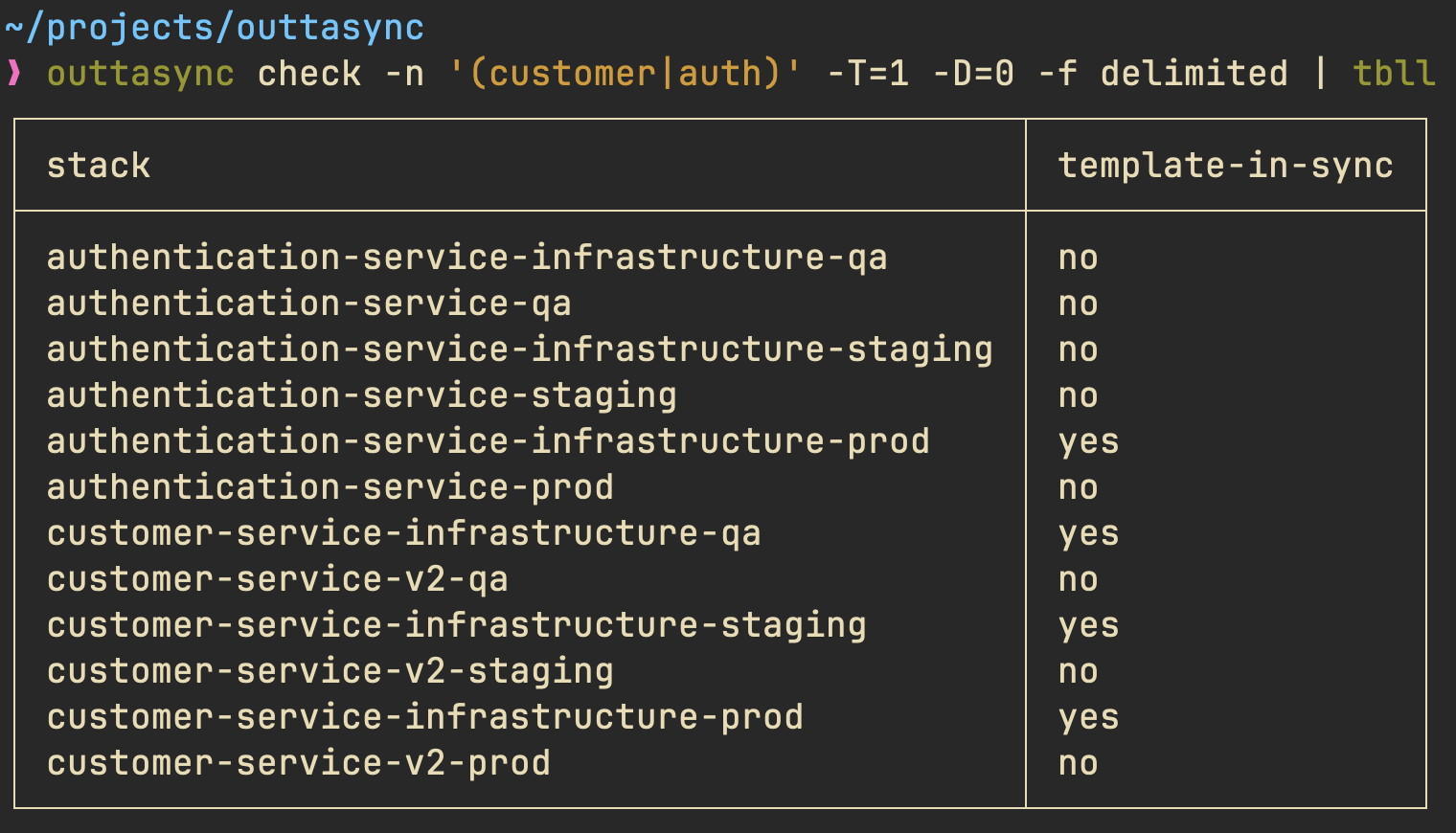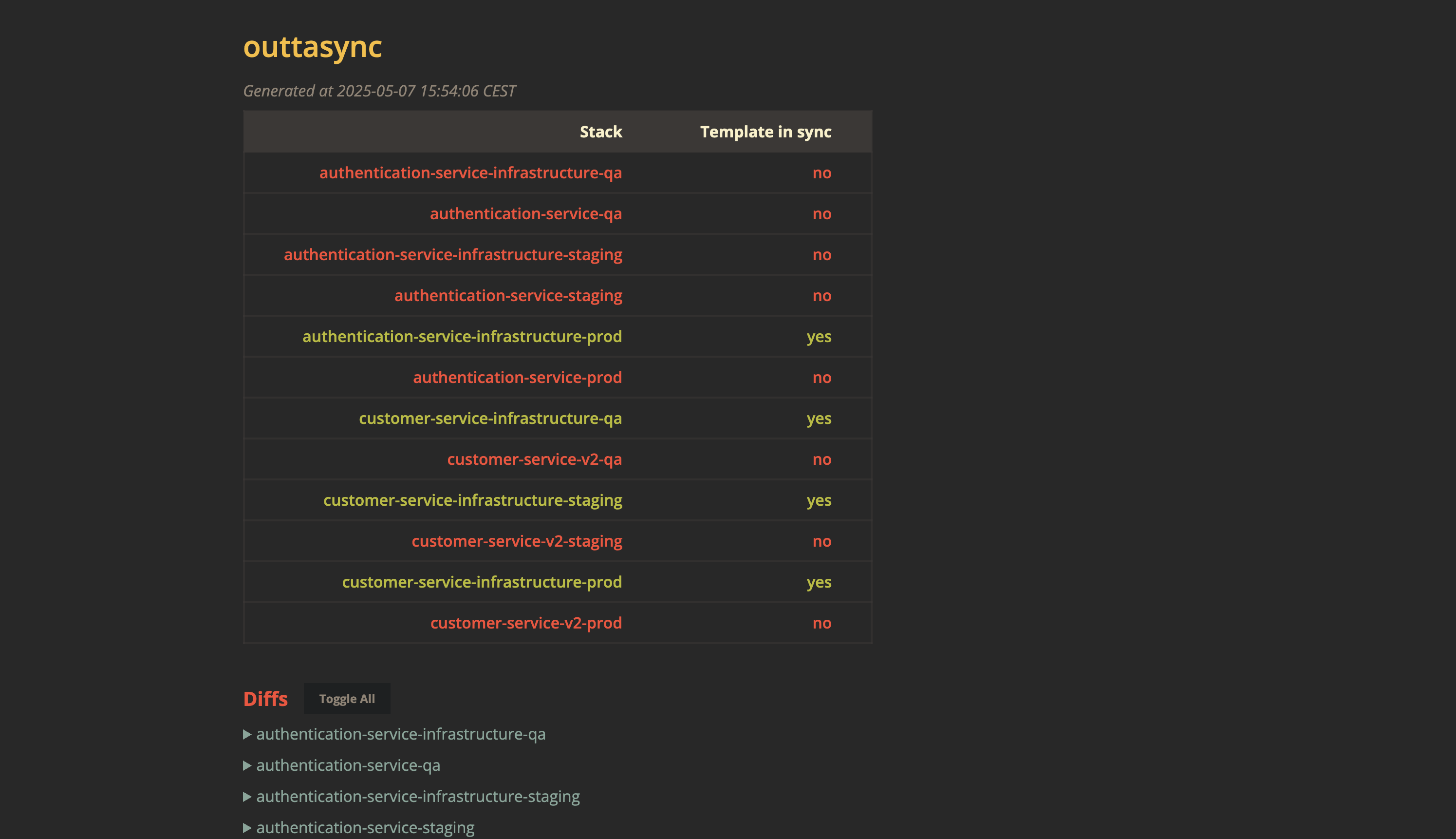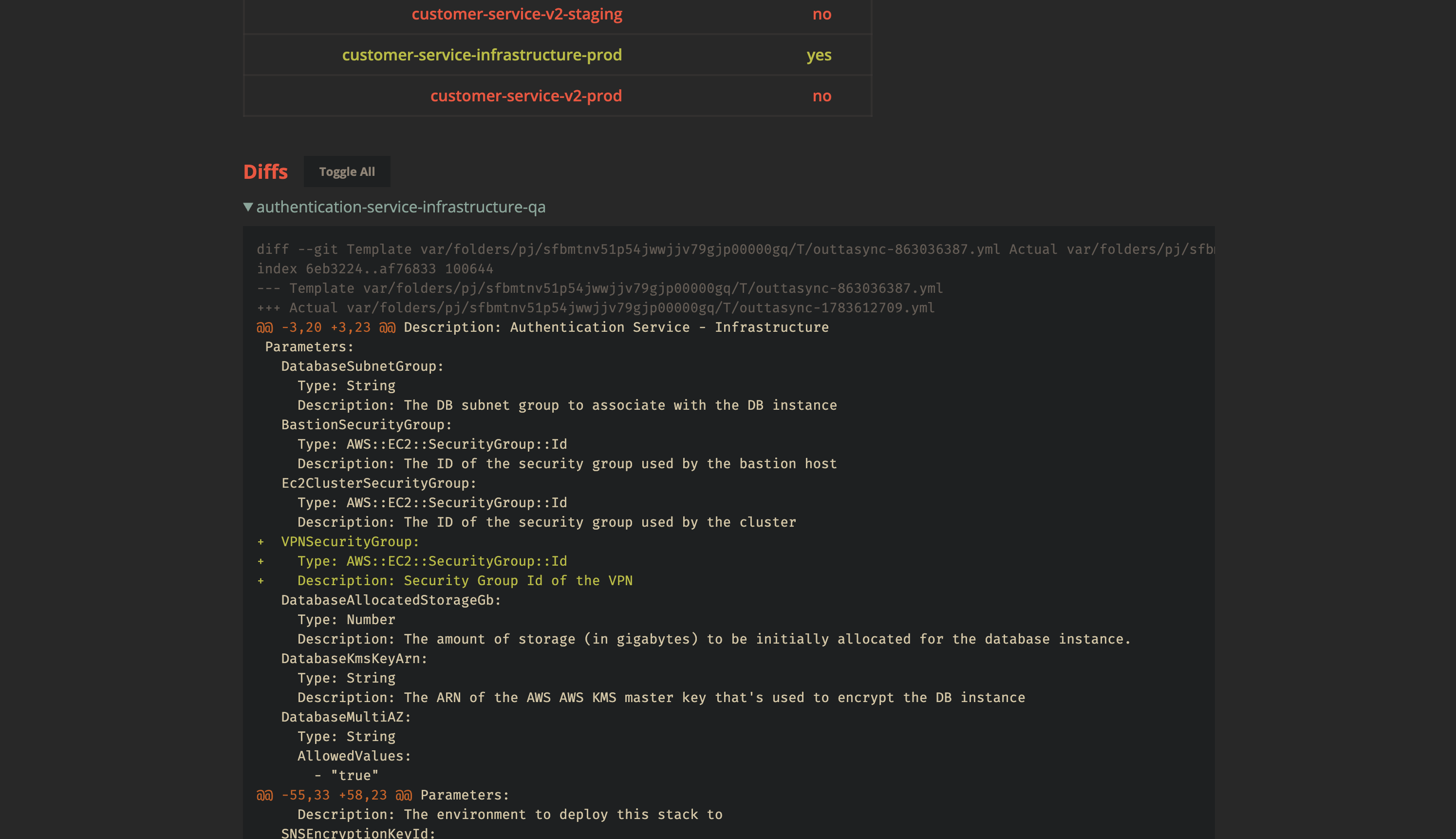outtasync helps you identify Cloudformation stacks that have drifted or gone
out of sync with the state represented by their template files.
homebrew:
brew install dhth/tap/outtasyncgo:
go install github.com/dhth/outtasync@latestOr get the binary directly from a release. Read more about verifying the authenticity of released artifacts here.
git(used to compute diff for out-of-sync changes)outtasyncdoesn't change or override git's pager, so the diff will follow your.gitconfigsettings (if present).
Create a configuration file that looks like the following. To determine where
outtasync looks for this file by default on your OS, run outtasync check -h
and look at the output.
stacks:
- name: bingo-service-qa
# use this to provide configuration and credentials via environment variables
# https://docs.aws.amazon.com/sdkref/latest/guide/environment-variables.html
config_source: env
arn: arn:aws:cloudformation:eu-central-1:000000000000:stack/bingo-service-qa/00000000-1111-2222-33333333333333333
template_path: ~/projects/bingo-service/cloudformation/infrastructure.yml
tags:
- qa
- name: papaya-service-staging
# use this to leverage a profile contained in the shared AWS config and credentials files
# https://docs.aws.amazon.com/sdkref/latest/guide/file-format.html
config_source: profile:<PROFILE_NAME>
arn: arn:aws:cloudformation:eu-central-1:000000000000:stack/bingo-service-qa/00000000-4444-5555-66666666666666666
template_path: https://url.where/your/stack/template/file/is/located/cloudformation.yml
remote_call_headers:
- key: Authorization
value: "token $STACK_SPECIFIC_TOKEN"
- key: Header
value: "to use for sending request to the url defined by template_path"
tags:
- staging
- name: galactus-service-prod
# use this when you want to provide configuration and credentials via environment variables
# but want to assume another role for performing the actual operations
config_source: assume::<IAM_ROLE_ARN>
arn: arn:aws:cloudformation:eu-central-1:000000000000:stack/galactus-service-prod/00000000-7777-8888-99999999999999999
template_path: "$SOME_ENV_VAR/path/to/file.yml"
tags:
- prod
# these are applied globally to all stacks where template_path is a URL
remote_call_headers:
- key: Authorization
value: "token $GLOBAL_GH_TOKEN"outtasync provides the following subcommands:
outtasync tui: for opening up outtasync's TUIouttasync check: for checking for drift status and template sync status on the command lineouttasync config: for interacting with outtasync's config
$ outtasync tui -h
open outtasync's tui
Usage:
outtasync tui [flags]
Flags:
-c, --config-file string location of outtasync's config file
-h, --help help for tui
-n, --name-filter string regex for name(s) (configured in outtasync's config) to filter stacks by
-t, --tags-filter string regex for tag(s) to filter stacks by
| Keymap | What it does |
|---|---|
q |
go back |
esc/ctrl+c |
quit immediately |
| Keymap | What it does |
|---|---|
j/↓ |
move cursor down |
k/↑ |
move cursor up |
h |
go to previous page |
l |
go to next page |
g |
go to the top |
G |
go to the end |
tab/<S-tab> |
move between filter states |
1 |
filter for stacks with code mismatch |
2 |
filter for stacks that've drifted |
3 |
filter for stacks with errors |
s |
check template sync status for stack under cursor (when unfiltered) |
S |
check template sync status for all stacks (when unfiltered) |
<ctrl+s> |
show sync check results (requires git to be available in PATH) |
d |
check drift status for stack under cursor (when unfiltered) |
D |
check drift status for all stacks (when unfiltered) |
e |
show error details (if present) |
$ outtasync check -h
check sync and drift status for stacks
Usage:
outtasync check [flags]
Flags:
-D, --check-drift check drift status (only applicable in cli mode) (default true)
-T, --compare-template compare actual template with template code (only applicable in cli mode)
-c, --config-file string location of outtasync's config file
-f, --format string output format [possible values: default, delimited, html] (default "default")
-h, --help help for check
-o, --html-open open html output in browser instead of outputting to stdout
--html-template-file string location of the template file to use for html output
--html-title string title of the html output (default "outtasync")
-N, --list-negatives-only list negatives only
-n, --name-filter string regex for name(s) (configured in outtasync's config) to filter stacks by
-p, --progress-indicator whether to show progress indicator (only applicable in cli mode) (default true)
-t, --tags-filter string regex for tag(s) to filter stacks by
The check subcommand can output results in 3 formats: ansi colored text,
delimited, and HTML.
outtasync check -n '(customer|auth)' -T=1 -D=0outtasync check -n '(customer|auth)' -T=1 -D=0 -f delimited | tbllouttasync check -n '(customer|auth)' -T=1 -D=0 -f htmlouttasync allows you to generate its own config.
$ outtasync config generate
generate sample config
Usage:
outtasync config generate [flags]
Flags:
-c, --config-source string config source to use (default "env")
-h, --help help for generate
-n, --name-filter string regex for name(s) to filter stacks by
-t, --tags string comma separated list of tags to use
You can also validate a config file using outtasync config validate.
In case you get the outtasync binary directly from a
release, you may want to verify
its authenticity. Checksums are applied to all released artifacts, and the
resulting checksum file is signed using
cosign.
Steps to verify (replace x.y.z in the commands listed below with the version
you want):
-
Download the following files from the release:
- outtasync_x.y.z_checksums.txt
- outtasync_x.y.z_checksums.txt.pem
- outtasync_x.y.z_checksums.txt.sig
-
Verify the signature:
cosign verify-blob outtasync_x.y.z_checksums.txt \ --certificate outtasync_x.y.z_checksums.txt.pem \ --signature outtasync_x.y.z_checksums.txt.sig \ --certificate-identity-regexp 'https://github\.com/dhth/outtasync/\.github/workflows/.+' \ --certificate-oidc-issuer "https://token.actions.githubusercontent.com" -
Download the compressed archive you want, and validate its checksum:
curl -sSLO https://github.com/dhth/outtasync/releases/download/vx.y.z/outtasync_x.y.z_linux_amd64.tar.gz sha256sum --ignore-missing -c outtasync_x.y.z_checksums.txt
-
If checksum validation goes through, uncompress the archive:
tar -xzf outtasync_x.y.z_linux_amd64.tar.gz ./outtasync # profit!









